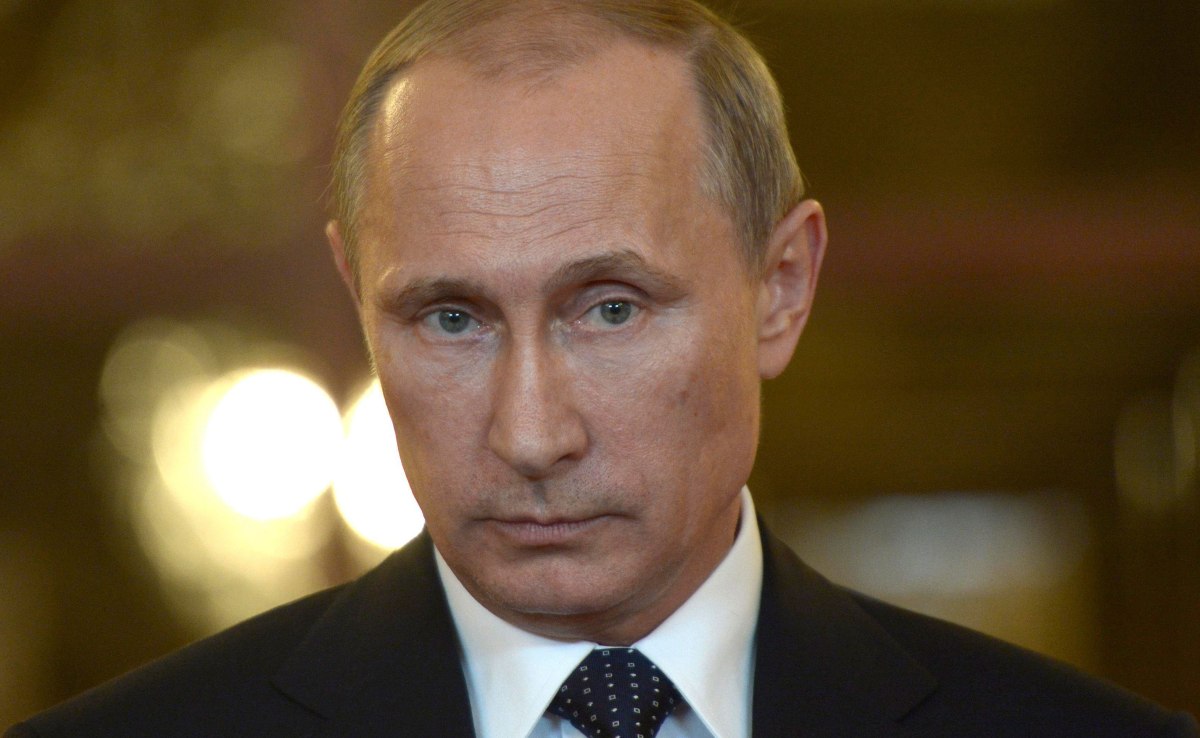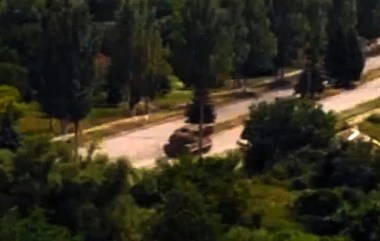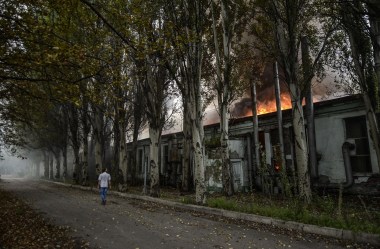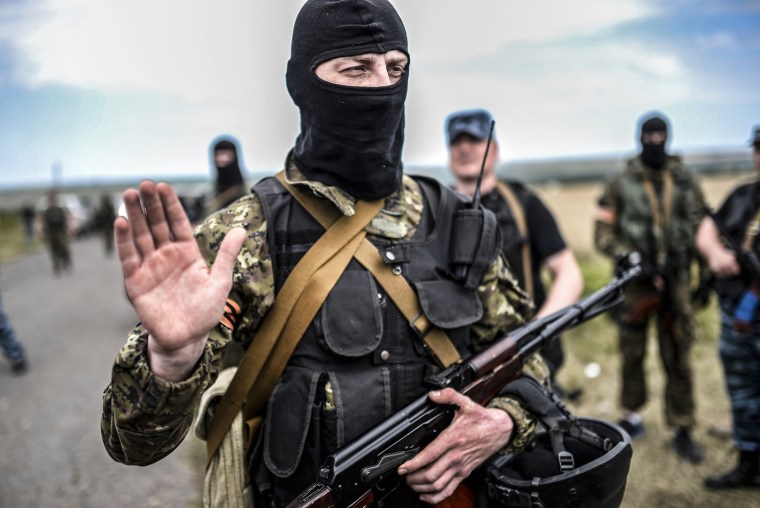
On the ground with Ukraine’s rebels after the crash. A TIME correspondent, arrested there last week for “the crime of journalism,” on the comeuppance awaiting the Russian president![]()
By Simon Shuster/Donetsk | July 28, 2014

The young prisoner did not lift his eyes as he came towards me from the entrance of the basement where he was being kept. There was a gunman behind him, hurrying him along, and the act of climbing a small flight of stairs seemed to take all of his focus. “Take it easy,” he told the guard behind him. “Everything’s been beaten out of me.” Even in the sparse light of the rebel headquarters the wounds and bruises showed all over his face, some nearly healed, others still fresh and beginning to scab. His bare chest was visible beneath what looked like a woman’s overcoat. He appeared to be my age, about 30 years old.
The sight of him, and the terrible smell he gave off, must have made my face go pale, because the rebel fighter sitting next to me looked up from his desk and shot me a smile. He had been busy filling out my “arrest protocol,” meticulously noting the details of my detention. Just a few minutes earlier he had told me how they treat their prisoners well, how nothing bad would happen here. Earlier that morning, on July 20, he had also tried to fool me and two other reporters at the morgue in the rebel-held Ukrainian city of Donetsk, where we had gone to look for the bodies of passengers from Malaysia Airlines Flight 17, allegedly shot down by the pro-Russian separatists waging a war against the Ukrainian government forces. “Are you detaining us?” I had asked in disbelief as he ordered us into his car. “Not at all,” he’d said, adjusting the strap of his rifle. “We’re just going to get your accreditation sorted out at the press center.”

Deception, even when the truth is obvious, is a taste the rebels in Ukraine have acquired as their war has grown more vicious and more desperate. There had been a kind of dignity among them early on, at least with many of the ones I met, when they still believed they were the vanguard in an epic crusade to gather up Russian lands and humble the arrogant United States. In reality they have turned out to be just pawns, protecting their roadblocks and barricades of trash until the Kremlin decides what to do with them. The rebels had been counting on a Russian invasion. The West wanted what its leaders called “de-escalation.” What Russia did was something in between, feeding the conflict while lying about it, and the result was the nightmare of flight MH17.
For the rebel fighters the consequences of that disaster have made deception not just an idle habit or an occasional necessity. It is now a key prerogative. In order to stick to the Kremlin line, and thereby avoid breaking their main source of support from across the border, they will have to make claims about themselves and about the tragedy of MH17 that are increasingly hard to defend.
![]()
“Take it easy,” the prisoner told the guard.
“Everything’s been beaten out of me.”
![]()
Start with the presence of BUK anti-aircraft missile systems in their arsenal. These weapons, one of which was apparently used to shoot down flight MH17, were the pride of the rebels’ collection in the region of Donetsk. They bragged about having them for weeks before the airliner went down, as did the Russian state media. Locals and journalists had seen these mobile missile launchers driving around rebel-controlled areas. “The skies above Donetsk will now be protected by the BUK surface-to-air missile complex,” rejoiced the Kremlin’s main propaganda channel, Vesti, as it reported on June 29 that the rebels had seized these weapons from the Ukrainian military.
Three weeks later the story changed. Vesti reported the day after MH17 went down that the rebels could not possibly have had BUK missiles, and Alexander Borodai, the rebel leader in Donetsk, lost his temper when I asked him to explain the contradiction. “Don’t be so naïve!” he said during a briefing at his headquarters on July 20. “What we give you is real information. Everything else is total rubbish,” he said. That included the June 29 report, he said, on the website of the official Kremlin broadcaster.
The exchange with Borodai, who is now the lead negotiator for all matters pertaining to the crash site of MH17, brought to mind an old Soviet joke about a member of the communist party brought before a tribunal. How could it be, the man is asked, that he supported Josef Stalin’s purges while the tyrant was alive, but condemned them after his death. Had the man stuck to the party line or had he wavered? “I wavered,” the man replies, “in lock step with the party line.”
Borodai has experience in shaping political narratives as expediency dictates. Before he declared himself the Prime Minister of the breakaway republic of Donetsk in April, he worked as a “political technologist” in Moscow — or, in other words, a spin doctor. One of his former clients, the Kremlin-connected billionaire Konstantin Malofeev, said in May that Borodai had worked as his “PR manager” for about three years before becoming a separatist leader in Ukraine. “In my view, he was one of the best in Russia,” Malofeev told the Russian edition of Forbes.

But some other rebel leaders are apparently less at ease with bending the truth — or are less willing to do so. The military commander of the separatists in Donetsk, Igor Girkin, has dropped out of sight since the MH17 disaster, even shutting himself inside an office in the rebel headquarters and refusing to come out on July 20 to speak to a group of reporters who stood asking for him outside the door. Another rebel commander, Alexander Khodakovsky of the Vostok battalion, seemed to have a moment of candor on Wednesday when he spoke to a Reuters reporter.
A BUK missile complex, he said, had indeed been in the hands of rebels in eastern Ukraine. “I’m not going to say Russia gave these things or didn’t give them,” said Khodakovsky. “Russia could have offered this BUK under some entirely local initiative. I want a BUK, and if someone offered me one, I wouldn’t turn it down.” At another point in the interview, he suggested the rebels received the missile system “through the fault of Russia.”
The following day, the Russian media launched a campaign to discredit that interview, citing a “source in Khodakovsky’s circle” as saying he had not in fact made those statements to Reuters, that the whole thing was a Western fabrication. And so the spin continued.
But four days after MH17 was shot down, the incident offered Russia a worrying lesson: the rebel leadership seems too diverse, and too divided, to reliably follow the Kremlin’s version of the story. Khodakovsky is a Ukrainian citizen — unlike some of the other rebel leaders, who are Russian citizens. He is the former commander of an elite counter-terrorism unit in Ukraine. Like many of his men, he sees himself as fighting a noble war to protect his own home from the assaults of the Ukrainian military, and he is not trained in the art of propaganda. To him and his men, lying about the downing of MH17 would be dishonorable.

There may be further leaks, finger-pointings or even confessions to come from the rebel ranks. How many of the separatist fighters would know the truth about who shot down MH17 is hard to gauge but it’s likely that a lot of people know what happened and who is directly responsible. It takes more than a dozen men to operate a BUK missile system, and many more would have heard chatter about the downing of the plane on their radios or over swigs of vodka at their barracks. If the rebel fighters did in fact shoot down MH17 by mistake, as U.S. intelligence has suggested, it will be hard for their commanders, let alone the distant forces of the Kremlin, to make all of them stick to one story and stay mum.
It’s not just the men on the ground who must struggle to keep their stories straight. Even Vladimir Putin seems to have found it impossible to maintain one of his most eye-catching deceptions during the conflict in Ukraine. As the Russian military moved in to occupy the region of Crimea in March, Putin claimed that there were no Russian soldiers on the ground in Crimea, insisting they were all local volunteers who had somehow gotten their hands on Russian uniforms and weapons. He did this to avoid admitting an obvious breach of international law, and to wrongfoot the Western diplomats who were trying to figure out what exactly he was doing in Crimea. But once he had annexed the peninsula and made it part of Russia and once he had seen the toothless round of sanctions imposed on Russia by the West in response to the annexation, Putin dropped the charade. “Of course our troops stood behind Crimea’s self-defense forces,” he said, during a live call-in show with the Russian public in mid-April.
![]()
Putin seems to have found it impossible to maintain one of his most outrageous deceptions
![]()
It was the first time in Putin’s tenure as President that he had so clearly admitted to lying to his own people and to the world, and the confession may have had a lot to do with his desire, as commander-in-chief, to acknowledge the service of his own officers in Crimea. Maintaining the lie about local “green men” taking over the peninsula could have been perceived among the Russian military as a sign that he was ashamed of the operation, or was trying to lie his way out of Western sanctions. For the sake of Russian military honor and the pride of the Russian public in having “gotten back” Crimea from Ukraine, he had to come clean.
But Putin hardly has the same option in the case of MH17, which offers nothing to be proud of for Russia or the rebel fighters. Putin’s assertion on the night after the crash that it was all Ukraine’s fault has locked him into that position, as have the efforts of Kremlin-controlled media in shielding the rebels from blame. Diverging now from the official line could be a national humiliation, one that would risk undermining the surge in support for Putin that followed his Crimean adventure.
Putin made some comments recently that revealed just how powerful he believes lying to be. During a discussion of the Holocaust on July 9, about a week before the MH17 tragedy, he recalled at a meeting with rabbis the efforts of Joseph Goebbels, the Nazi propaganda chief. “You said that one must be stupid to deny what happened,” he remarked to one of the rabbis at the Kremlin that day, referring to Holocaust deniers. “You know, I think that one must not just be stupid, but also shameless, to deny what occurred. But unfortunately, just like 70 years ago, this shamelessness often achieves its purposes. After all, Goebbels had said, ‘The more improbable the lie, the faster people believe it.’ And it worked out. He was a talented man.”
In the end, of course, the Nazis’ lies gave way to truth, which history suggests can’t be suppressed forever. In eastern Ukraine today, at the current pace of the conflict, what’s left of the rebel positions could fall in a matter of months if not weeks, and as their fighters have retreated, truths the rebels and Moscow would prefer to keep hidden are beginning to emerge. As the rebels have been forced to retreat their secrets are being uncovered. A mass grave was found on July 24 in the recently abandoned rebel stronghold of Slavyansk, according to a Human Rights Watch investigator who was on the scene. It contained more than a dozen bodies, which investigators are now trying to identify along with the likely causes of death. Eventually, if the Ukrainian army continues to advance, witnesses will likely emerge with testimony from the rebel prisons of Donetsk — assuming they survive.
Over the weekend, it was my good fortune not to join them in that prison basement. The fighter who had filled out my arrest sheet — listing my crime as journalism — then handed it to his commanding officer for review. We chatted briefly about Moscow, in whose suburbs I was born, and after looking through my passport he said to his subordinate: “We don’t need any extra ones [hostages] right now.” Then he turned to me and asked whether I would write anything bad about them. “We haven’t hurt you yet, have we?” I agreed that they had not. But by the time I walked free from their prison, the man I had seen limping up those stairs was no longer their secret to keep.